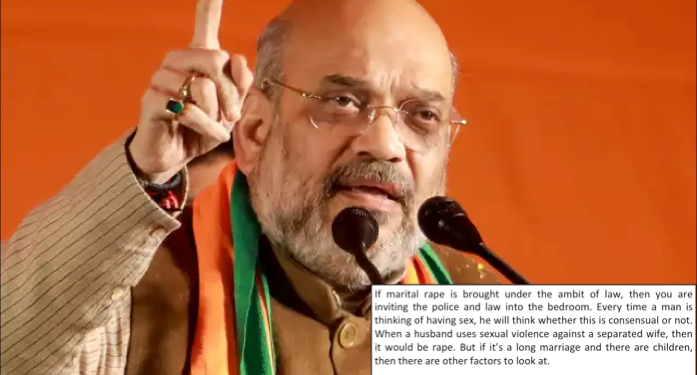A five-member committee constituted by the Ministry of Home Affairs under Amit Shah is looking at a sweeping overhaul of criminal laws — ranging from criminalising marital rape, making sexual offences gender-neutral to legalising euthanasia and revisiting sedition.
Many of the committee’s questions seek to harmonise the laws with judgments of the Supreme Court on issues such as euthanasia and sexual intercourse of man and his minor wife. In 2017, the SC in a landmark ruling had said that although marital rape is not a criminal offence, sexual intercourse of a man with his minor wife will be considered rape.
In a separate category on sexual offences, the committee has asked,
In the light of contemporary discourse on sexual and reproductive rights of women, can the offence of causing miscarriage can be decriminalised.
ALSO READ –
High Court Acquits Father After 5-Years In False Rape Case Filed By Daughter
The committee also sought to discuss the big question involved in rape cases: of defining consent. Although courts have settled the law on the consent of a woman in rape cases, it is an issue that is often debated. The committee asked,
What should be the standard of consent under Section 375 of the IPC?
Our Take:
With regards to criminalising Marital Rape, as a system, we shall be arming the women with yet another gender biased law where literally the word of the woman shall stand as final. In 2015, with the debate around criminalising Marital Rape coming to the fore, supreme court lawyer and media panelist, Sanjay Hegde said,
If marital rape is brought under the ambit of law, then you are inviting the police and law into the bedroom. Every time a man is thinking of having sex, he will think whether this is consensual or not. When a husband uses sexual violence against a separated wife, then it would be rape. But if it’s a long marriage and there are children, then there are other factors to look at.
ALSO READ –
Woman Files ‘Rape On Pretext Of Marriage’ Against Male Lawyer Who Was Fighting Her Alimony Case
In our opinion, there can never be a definite Yes or a No by the woman before getting physical and there could be a possibility of a woman waking up next morning and believing she had been ‘raped’ by her husband. Of course one cannot and must not overlook the misuse of this law because it will be next to impossible for a man to prove his innocence.
Currently Section 498A is the most grossly abused law — also conceded by Supreme Court — however, the charges under this section referring to dowry harassment and violence on women are still tangible to some extent. What options will a husband have to defend himself if a wife falsely accuses him of marital rape?
The best arguments in every case is ‘misuse is rampant for every law’ and thus that cannot be the sole reason not to bring the same into force. However, today when several unmarried/married women are dragging men to court charging them with ‘rape on pretext of marriage’, the marital rape law will be yet another tool where husbands will be held to ransom to bow down to every single demand of the wife, else face the law under false charges.
ALSO READ –
Gurugram Woman Arrested For Filing False Gang Rape Case & Extorting Rs 30 Lakhs
With regards to justice for women who do genuinely undergo marital rape, Section 498A and Domestic Violence Act 2005 are relevant sections under which the same can be covered and the women can subsequently get justice. However, adding one more gender biased law will be the final nail in the coffin for every husband and his family in India — especially in a country where there is absolutely no punishment for wives to file false cases and get away without conviction.
Lastly, whether marital rape law will be gender neutral if it comes into force, is also a question that remains unanswered as of now.
Other Discussions By The Committee
The committee, constituted on May 5, is also considering the introduction of special laws to counter violent incidents that have dominated social and political discourse including mob-lynching and “honour killing.”
In December 2019, Union Home Minister Amit Shah had informed Parliament that the government was looking at necessary amendments in IPC and CrPC to deal with issues related to mob lynching, as members of Parliament called for a separate law to curb it.
The Ranbir Singh (Vice-Chancellor of National Law University, Delhi) committee has sought suggestions on whether there is a need to alter the minimum age of criminal responsibility to commit an offence. In 2015, the law was amended to treat a juvenile above the age of 16 years as an adult for heinous crimes and be punished with life imprisonment or death.
ALSO READ –
When NRI Husband Stopped Paying Money To Wife’s Family, She Filed False 498A Against Him
On revising punishment for various offences, the committee asked if “additional types of punishment — based on objectives of deterrence, rehabilitation, restoration etc — be inserted” in the Indian Penal Code. It did not, however, specify what additional types of punishment are being considered.
The IPC prescribes fines, imprisonment, forfeiture of property and the death penalty. In another question on punishment, the committee asked if there are any offences for which the quantum of punishment must be revised.
ALSO READ –
http://voiceformenindia.com/in-the-news/false-gang-rape-case-panipat/
http://voiceformenindia.com/in-the-law/madras-hc-comes-out-against-misuse-of-pocso-act/
Please join us on our Facebook Group for interactions and debates
Join our Facebook Group or follow us on social media by clicking on the icons below
If you find value in our work, you may choose to donate to Voice For Men Foundation via Milaap OR via UPI: voiceformenindia@hdfcbank (80G tax exemption applicable)






























